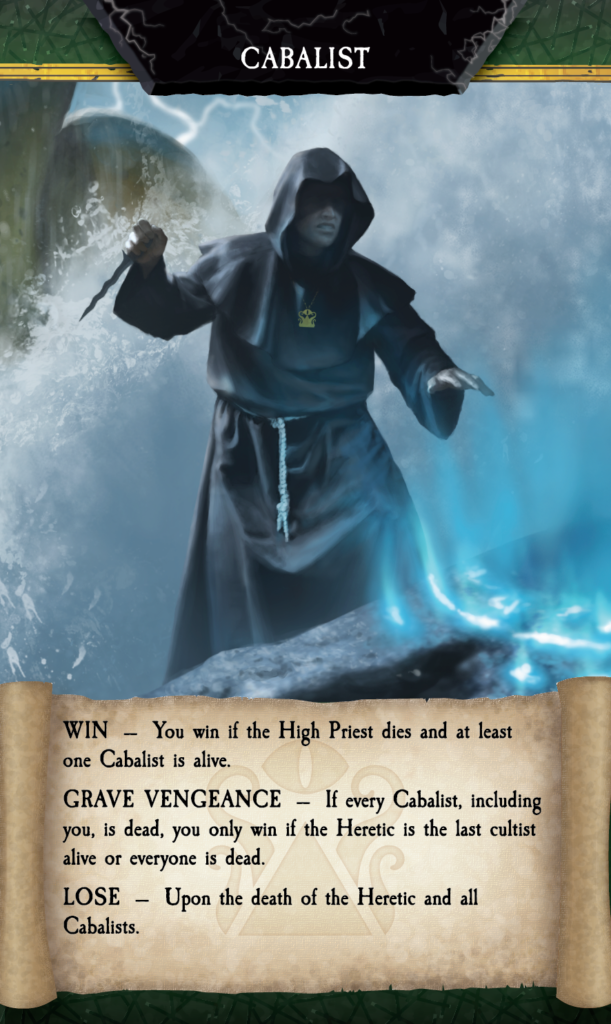Sam “King of the Hilltop”
The hidden role mechanic is interesting to me. It’s not a mechanic that tends to stand all by itself. It is usually paired with other mechanics and is often lumped into social deduction. Now, I am not saying it is not related to social deduction but there is a key difference which makes hidden role unique but also almost a sub-category of social deduction.
Definitions
Let’s start with some definitions from Board Game Geek:
Hidden Role – One or more players are assigned differing roles that are not publicly revealed at the start of play.
Deduction – Players are trying to determine the identity of hidden information based on clues.
Now, hidden roles is a mechanic that fits into the social deduction frame work really well. It is also closely related to traitor mechanics as the idea that there is hidden information and assigned roles is a dominant feature. However, like many mechanics, it is not limited to just a certain kind of social deduction; it can be used in a variety of ways.
Why Choose Hidden Roles
When using mechanics in a game, you need a reason, a plan. You choose to do hidden roles because you want to add a sense of mystery and unknown. By adding that unknown, people have to pay attention to what other players are doing and saying. You are advocating that people should be interacting to find common goals and motivations. This will tend to introduce bluffing and lying as ways to achieve goals.
It also can create asymmetric goals, as each role or faction has a different end game in mind. This is not always true, a game like Coup uses the hidden roles themselves as a bluffing mechanic in order to help achieve victory, not the end result. However, they share the idea of different win conditions or strategies based on roles. This can make multiple play throughs of a game different as you need to have different strategies in mind based on the role you are given.
This mechanic can really make for tense, emotional moments and adds a layer of complexity in board games that is different from adding complicated mechanical structures. The rules are usually fairly simple but the impacts and consequences of your actions tend to have a large weight to them, changing the course of games in big ways.
Why You Don’t Choose Hidden Roles
For the reasons above, you may not want that social interaction. There is nothing wrong with that. People like and play a large variety of games. Hidden role is a personal favorite of mine as it brings that player interaction, but often times that interaction can be adversarial. So, if you want to avoid “take that” mechanics, aggressive game play, or concepts of bluffing and lying, hidden roles will likely not be for the game you are designing. There will be exceptions and I would love to hear about them but as a whole, there tends to be aggression.
What We Did For Our Design
We chose to do hidden roles for Cult of the Deep because it made total sense thematically and it was the right feel for the game. Bluffing, betrayal, aggressive plays, it was all how we think a cult bent on power would run.
The roles in the game are:
High Priest – Root out corruption in the cult. Kill all Cabalists, the Heretic, and survive. (The only role not hidden.)
Cabalists – Seek to take control of the cult. Kill the High Priest.
Faithful – Protect the High Priest from threats to their power. Kill all Cabalists, the Heretic, and the High Priest must survive.
Heretic – Burn the whole cult to the ground. Kill the entire cult, yourself included if necessary.
However, we didn’t like the player elimination of a lot of games so we designed the idea of wraiths. When you are killed, you are not out, you will gain a wraith card with different abilities. Instead of playing like a normal player, you now haunt the dice of other players either adding, replacing, or removing dice from them with your own dice.
So, in order to deal with that, we had to add a death clause and win condition change for the Cabalist and the Heretic roles.

For the cabalists for example, if they are all dead and are wraiths, they can still win. They just have to help the heretic now. This shifting of alliances and win conditions can really make for intriguing game play and interaction.
Conclusion
Hidden roles is a very rewarding mechanic to pull off in a game and I would recommend you try it some time. It makes you think about the social aspects of your game on a different level. It dips heavily into trying to understand player motivations and thinking. Don’t be shy in trying it out or thinking about games with these mechanics. They can be quite fun. However, it’s not for every game. Make sure you are not shoehorning it into a game that doesn’t need or have a use for it.
Until next time, what are your favorite hidden role games? Social games? Do you know of any games with hidden roles or information that you would like to share with the community?
Hidden Roll
Ed “Duke of BAzlandia”
First things first, a funny story. Having demoed the game over the past years there are always fun and interesting interactions. When you meet someone for the first time and they ask what our game is about, we talk about how the game is a hidden role, dice game, and you play as a cultist. From there we then go on to explain the rules, how to play, and then proceed to demo the game. That’s where this story or interaction took place and we did the proceeding. The new player happened to be the High Priest and it was their turn first. New players often ask questions during every phase of their turn (I know I do when new to a game) to make sure they are doing things right. The first question is usually what should I roll for, what symbols are good, how many dice or rolls do I have. This time was different. This time the player asked how do I hide my dice when I roll…. Come to find out they had attached to the thought of “Hidden Roll” at the very beginning. We all had a good laugh, the new player included and figured out where we went wrong in explaining the game. Apparently when we talked about the different factions we never mentioned this was the Role that was hidden and only used the term Faction. Long story short, roll and role sound the same and make sure when explaining games players understand what their ROLE is.
Now that story time is done we can move onto the thrust of my thoughts for today. In the game Cult of the Deep, your role is to bring your faction to power within the cult (or destroy the cult if you are the Heretic). The thing about most hidden role games is that it relies on the player to act in a manner that a person trying to accomplish their hidden agenda would act. This is the most interesting thing about this genre of game. It requires you to enter what I hear referred to as the “magic circle”.
You have to be able to enter into the game with your fellow players and enter the story. In this case you enter the game as a Cult member vying for rituals and powers. You negotiate and act in ways to give hints of what faction you belong to but also cast doubt that you really belong to this faction. You create that story as you play the game, creating climactic actions with special powers and player interactions. My favorite thing about hidden role games is the story that is created together inside the “Magic Circle”.
One element of Cult of the Deep that really brings this about is the Necromantic High Priest variant. The Necromancer is a character that when dead can come back to life. When he is the High Priest, the game is not over when he dies. The Cabal does not win until the High Priest and all the Faithful are dead at the same time. This changes many normal interactions in the game. If you are a Faithful, and the need to protect the High Priest is gone, why would you? If he dies he can come back to life after certain requirements are met. It might be better to actually help kill him. This potentially allows others to see you as belonging to a faction that you are not. The reverse logic also holds true. What should you do as a Heretic? What is actually most beneficial to your faction, to your role?
If you were to ask me, this is what hidden role games are about. They are about the story, and the events that happen during that game. It’s really a crossover genre that combines two great things in gaming, RPGs and Board Games.
